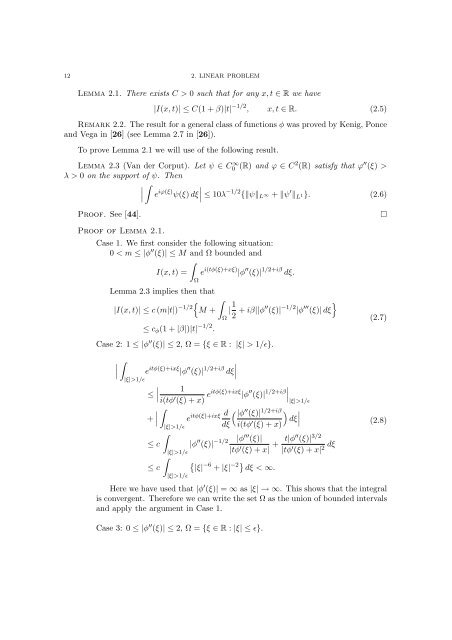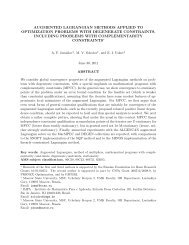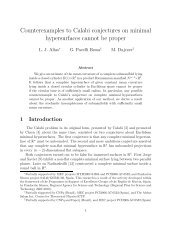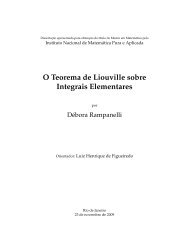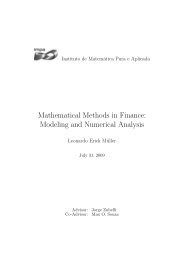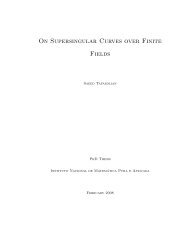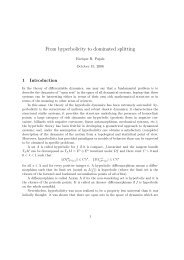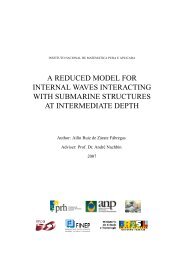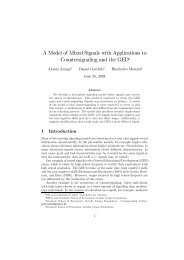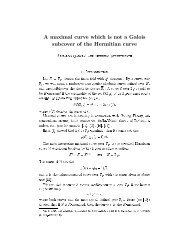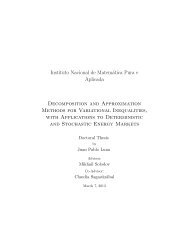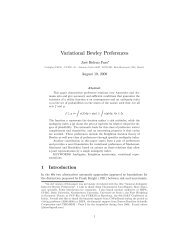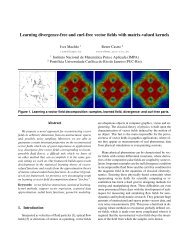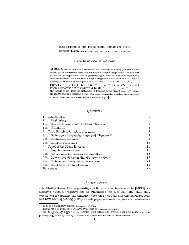Notes on Boussinesq Equation
Notes on Boussinesq Equation
Notes on Boussinesq Equation
You also want an ePaper? Increase the reach of your titles
YUMPU automatically turns print PDFs into web optimized ePapers that Google loves.
12 2. LINEAR PROBLEM<br />
Lemma 2.1. There exists C > 0 such that for any x, t ∈ R we have<br />
|I(x, t)| ≤ C(1 + β)|t| −1/2 , x, t ∈ R. (2.5)<br />
Remark 2.2. The result for a general class of functi<strong>on</strong>s φ was proved by Kenig, P<strong>on</strong>ce<br />
and Vega in [26] (see Lemma 2.7 in [26]).<br />
To prove Lemma 2.1 we will use of the following result.<br />
Lemma 2.3 (Van der Corput). Let ψ ∈ C0 ∞(R) and ϕ ∈ C2 (R) satisfy that ϕ ′′ (ξ) ><br />
λ > 0 <strong>on</strong> the support of ψ. Then<br />
∫<br />
∣ e iϕ(ξ) ψ(ξ) dξ∣ ≤ 10λ −1/2 {‖ψ‖ L ∞ + ‖ψ ′ ‖ L 1}. (2.6)<br />
Proof. See [44].<br />
□<br />
Proof of Lemma 2.1.<br />
Case 1. We first c<strong>on</strong>sider the following situati<strong>on</strong>:<br />
0 < m ≤ |φ ′′ (ξ)| ≤ M and Ω bounded and<br />
∫<br />
I(x, t) = e i(tφ(ξ)+xξ) |φ ′′ (ξ)| 1/2+iβ dξ.<br />
Lemma 2.3 implies then that<br />
|I(x, t)| ≤ c (m|t|) −1/2{ ∫<br />
M +<br />
Ω<br />
≤ c φ (1 + |β|)|t| −1/2 .<br />
Case 2: 1 ≤ |φ ′′ (ξ)| ≤ 2, Ω = {ξ ∈ R : |ξ| > 1/ɛ}.<br />
∫<br />
∣<br />
|ξ|>1/ɛ<br />
e itφ(ξ)+ixξ |φ ′′ (ξ)| 1/2+iβ dξ∣<br />
Ω<br />
| 1 }<br />
2 + iβ||φ′′ (ξ)| −1/2 |φ ′′′ (ξ)| dξ<br />
1<br />
∣<br />
≤ ∣<br />
i(tφ ′ (ξ) + x) eitφ(ξ)+ixξ |φ ′′ (ξ)| 1/2+iβ ∣∣|ξ|>1/ɛ<br />
∫<br />
+ ∣ e itφ(ξ)+ixξ d ( |φ ′′ (ξ)| 1/2+iβ )<br />
|ξ|>1/ɛ dξ i(tφ ′ dξ∣<br />
(ξ) + x)<br />
∫<br />
≤ c |φ ′′ (ξ)| −1/2 |φ ′′′ (ξ)|<br />
|ξ|>1/ɛ<br />
|tφ ′ (ξ) + x| + t|φ′′ (ξ)| 3/2<br />
|tφ ′ (ξ) + x| 2 dξ<br />
∫<br />
{<br />
≤ c |ξ| −6 + |ξ| −2} dξ < ∞.<br />
|ξ|>1/ɛ<br />
(2.7)<br />
(2.8)<br />
Here we have used that |φ ′ (ξ)| = ∞ as |ξ| → ∞. This shows that the integral<br />
is c<strong>on</strong>vergent. Therefore we can write the set Ω as the uni<strong>on</strong> of bounded intervals<br />
and apply the argument in Case 1.<br />
Case 3: 0 ≤ |φ ′′ (ξ)| ≤ 2, Ω = {ξ ∈ R : |ξ| ≤ ɛ}.


